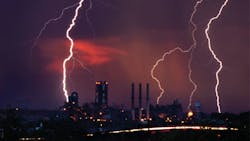More than 400 tornadoes had been reported across the United States as of late May, according to preliminary reports from the National Weather Service, and June typically remains an active month for these weather events.
In addition, the Atlantic hurricane season has just gotten underway.
So, while any time is a good time to discuss the importance of facility safety in the face of extreme weather, the start of summer is surely an appropriate time to issue a few reminders.
As with most everything, leadership sets the tone.
"Everything that is going to be accomplished is going to start with leadership and their support," says Jonathan W. Hall, executive vice president of commercial and industrial property insurance firm FM Global.
That means by word and by deed leaders must demonstrate that operating safely is important to the company. Provide clear direction, have a property conservation statement that emphasizes safe operations and building resiliency, and stress expectations that the workforce adhere to safety measures.
"It's night and day, that clear support between companies that get [safety] and companies that don't," Hall says.
In addition, building to code is clearly important. In some locations, exceeding code is important as local codes may be inadequate, or inadequately enforced. "This has huge implications; codes are night and day around the world," Hall says.
That said, the importance of employee training cannot be minimized, and this metric tells the tale: In about 70% of losses, or seven in 10 instances, a human being was a factor, Hall says.
What does that mean, exactly? Hall says that while a tornado, hurricane, flood or other event may initiate property loss, in a high percentage of cases the loss is made worse by a human factor. That factor could be a failure by the workforce to follow procedures, such as bringing property indoors during a hurricane, for example, or failing to assure that drains are kept clear of debris.
"Every loss, whether related to a natural disaster or not, can be minimized or maximized by human intervention," Hall says.
That human intervention includes contractors. Hall says one of FM Global's leading causes of loss relates to contractors.
"We have clients that do great things, have great emergency plans, and then allow in a contractor from an outside firm with a blow torch, and leave them unsupervised -- and the roof catches on fire," he says. This concern has increased over time as companies look to cut costs and outsource an increasing number of activities, Hall notes.
He advises contractors be closely monitored by a company's own employees. Moreover, he says many of his firm's best clients develop safety courses and require safety testing before they allow a contractor on site.
Ultimately, to assure a well-managed facility safety plan, "you have to be very holistic in your thinking," Hall concludes.
About the Author
Jill Jusko
Bio: Jill Jusko is executive editor for IndustryWeek. She has been writing about manufacturing operations leadership for more than 20 years. Her coverage spotlights companies that are in pursuit of world-class results in quality, productivity, cost and other benchmarks by implementing the latest continuous improvement and lean/Six-Sigma strategies. Jill also coordinates IndustryWeek’s Best Plants Awards Program, which annually salutes the leading manufacturing facilities in North America.
Have a story idea? Send it to [email protected].


